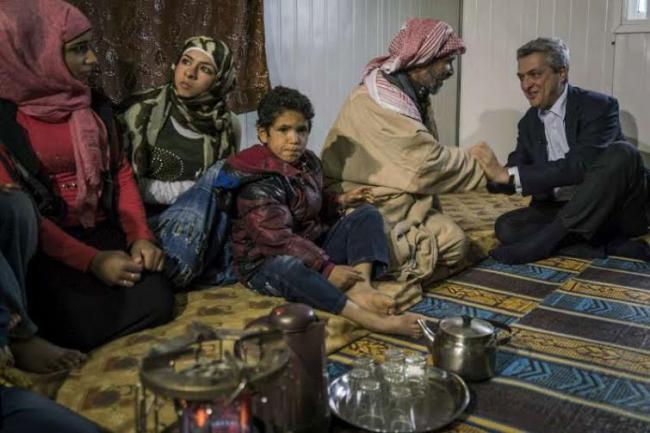“It is essential that the international community and all actors that have an influence on the parties to the conflict – and the parties to the conflict themselves, first and foremost – exercise greater efforts towards peace,” Filippo Grandi told reporters while visiting Jordan’s Za’atari refugee camp.
Three weeks after taking up office, Grandi said he had chosen to travel to the region on his first overseas trip to focus minds on finding solutions to the nearly five-year-old conflict.
“If a settlement of the conflict is not found, this crisis will not end and we will continue year after year to ask the international community for huge amounts of money to support refugees that – until there is peace – will not want to go back,” he stated.
Grandi urged governments to take advantage of two upcoming global conferences in London in February and Geneva in March to pledge more financial support for refugees and host countries, and increase the number of legal resettlement places for those escaping the conflict.
According to the High Commissioner’s Office (UNHCR), the protracted nature of the crisis is having a devastating effect on millions of ordinary Syrians, as well as placing a huge burden on neighbouring countries that have so far taken in more than four million refugees.
Jordan is currently host to more than 630,000 Syrian refugees, putting a huge strain on the small kingdom’s natural resources, infrastructure and economy.
While almost 110,000 Syrians currently live in Za’atari and the country’s other main camp at Azraq, the vast majority are struggling to survive in towns and cities across Jordan.
Addressing the plight of an estimated 17,000 Syrians currently camped near the country’s north-eastern border, Grandi said he fully appreciated Jordan’s security concerns and pledged UNHCR’s help in screening individuals in order to allow those in need of international protection to enter the kingdom.
While at the camp, he met a Syrian Bedouin family who arrived in Za’atari in February 2013. A father of six, Mohammad Olayan said he had witnessed a steady improvement in conditions during his three years there.
“When we first came we were living in a tent and there were no services. Now we have two caravans, and there is electricity and proper sanitation,” he said.
Despite the improvements, the family still struggles to feed themselves with the food assistance they receive, and Mohammad must borrow money or try to find work to keep food on the table.
While his three young sons attend school in the camp, his two school-aged daughters say they are still too traumatized by the conflict and intimidated by the large class sizes to go. As a result, Mohammed and his wife and daughters spend much of their time inside their shelter.
“What else can refugees do?” he asked.
After three years in exile with no end in sight, Mohammad said he is considering returning to the family's small farm in Syria’s southern Dara'a province despite the danger.
“We don't want to run away for the rest of our lives,” he explained. “Maybe it would be better to die quickly in Syria than the slow death we face here.”
The High Commissioner’s visit also includes stops in Turkey and Lebanon.
Photo: UNHCR/Christopher Herwig
